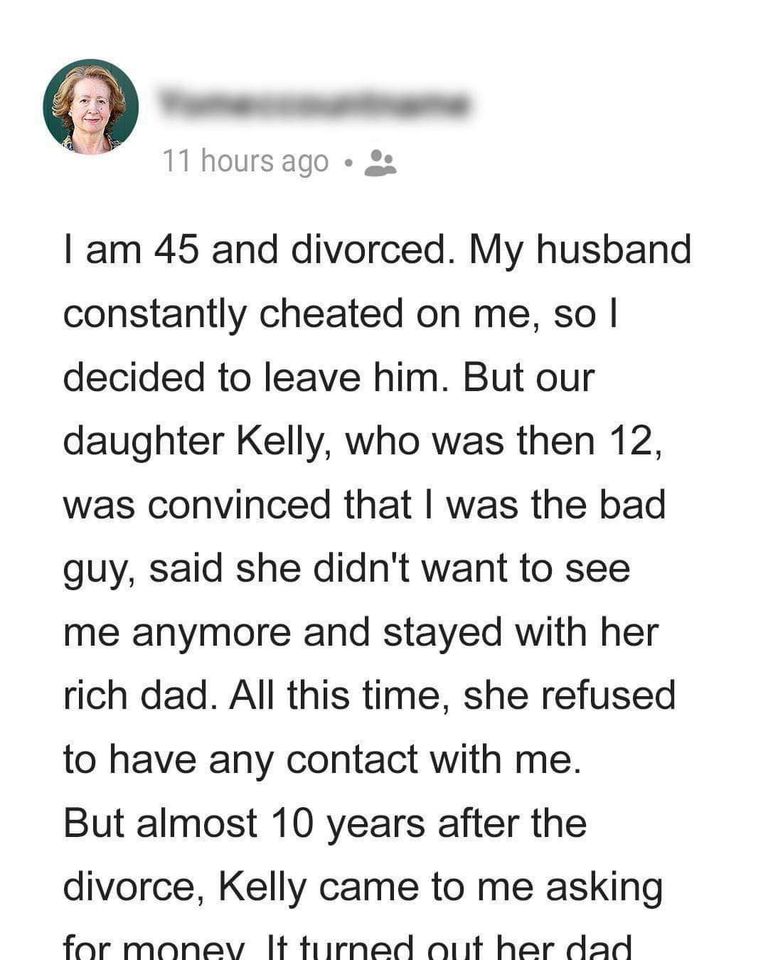I am 45 and divorced. My marriage ended because my husband cheated on me many times. I tried to stay strong for our daughter, Kelly, who was 12 at the time. But when I finally decided to leave him, Kelly did not understand. She was convinced that I was the bad person in the story. She said awful things to me, telling me that I broke our family and that she never wanted to see me again. Then she decided to stay with her dad, who was wealthy and could give her a life full of luxuries. From that moment on, she cut off all contact with me, refusing to answer my calls or messages.

At first, I sent Kelly letters every week, hoping she would read them and realize how much I loved her. I wrote about my day, shared funny stories, and even tucked in small gifts now and then. But she never responded. I remember crying on the kitchen floor, reading the same letters over and over, wondering what I could have done differently to make her stay with me. My ex-husband was happy to keep her under his roof. He bought her the newest gadgets, gave her a big allowance, and let her hang out with her rich friends. Meanwhile, I was struggling to rebuild my life from scratch.
Over the years, I found a modest home, worked two jobs, and slowly saved up enough money to feel secure. I did not have the lavish lifestyle my ex-husband had, but I had peace of mind. I was no longer living in a house full of lies and betrayal. Sometimes, I would see photos of Kelly online through mutual friends or by stumbling upon her public social media posts. She looked happy, attending parties and showing off fancy clothes, purses, and even her own car when she turned 16. It broke my heart that she did all these things without ever calling me or letting me know she was okay.
My ex-husband rarely contacted me. In fact, the few times I heard from him were about legal issues, like updating me about some paperwork or a tax document. I learned through mutual acquaintances that he had continued his extravagant lifestyle, dating multiple women and going on expensive vacations. But he never missed an opportunity to shower Kelly with gifts. On her 18th birthday, he held a grand celebration, with fireworks and a live band, from what I heard. I was not invited, of course. Kelly made it clear I was not welcome.
Fast forward almost ten years after the divorce. I was at home on a quiet Saturday morning, sipping coffee and reading a book. Suddenly, I heard a knock at my door. When I opened it, I saw Kelly standing there. She looked different—older, of course, and there was a nervous energy about her. Her eyes darted around, and she shifted from foot to foot. I could hardly speak. I felt a thousand emotions rushing in at once: joy, fear, anger, hope.
Kelly spoke first. “Mom, I need to talk to you,” she said. My heart skipped a beat just hearing her call me “Mom.” I invited her inside, trying to hide the trembling in my hands. She asked if I had any coffee, so I poured us both a cup. We sat at the small table in my kitchen, a place she had not seen in years.
Then she dropped the news: she was there to ask for money. She explained that her dad had recently lost a lot of money in a bad business deal, and he was not willing to pay for her college anymore. Her eyes grew wet with tears as she admitted that she might have to leave her expensive school if she could not find the funds. It seemed that her father had suddenly shut down all the financial support he had promised. She said, “Mom, I don’t know what else to do. You’re my only hope right now.”
I sat there, feeling both sad and angry. For almost ten years, Kelly had refused to speak to me. She blocked me on every platform. She had never replied to any of my letters, messages, or phone calls. Yet now, she was sitting in my kitchen, asking for money. Part of me wanted to jump up and hug her, tell her it was all going to be okay, and promise her the world. But another part of me felt hurt and used. I questioned whether she truly wanted to mend our relationship or if she just saw me as a last resort for financial support.
I asked her, “Kelly, why didn’t you contact me before? Why now?” She looked away, tears rolling down her cheeks. She said she was scared and ashamed. She worried I might still be angry with her for choosing her dad. She was also used to a certain kind of lifestyle—one I could never provide. I realized that even now, she was thinking of her future in a very practical way. She needed tuition and living expenses, and she was no longer Daddy’s little princess because Daddy had lost his wealth.
I had dreamed of a reunion with my daughter, but I pictured it differently—full of apologies, understanding, and a willingness to rebuild our bond. Instead, she came asking for something material. I felt torn. Deep inside, I wanted to help my child. I wanted her to succeed and have the education she deserved. But I also did not want to be treated like a walking bank account.
I told Kelly we should see a financial advisor together, or maybe explore scholarships or part-time jobs. She looked annoyed when I mentioned her getting a job. Perhaps she was not prepared for a life without easy money. Even so, I tried to stay calm and gentle, telling her that I would think about how I could help. For the first time, she noticed that my resources were limited. I saw a flash of confusion in her eyes—maybe she had believed that, because I was her mother, I would automatically have everything she needed.
In the end, Kelly left without a clear answer from me. I told her I needed some time to figure out what was best. She nodded, thanked me with a weak smile, and walked out the door. I watched her go, my heart heavy. I still love my daughter more than words can say, but I also feel deeply hurt by how she only came to me in her time of financial need, ignoring me for all those years before.
That night, I sat in my living room, staring at an old photo of Kelly at age 12. She used to have such a big smile, arms wrapped around me, looking so happy. I wiped away tears and wondered if this money problem could actually be the bridge that brings us back together, or if it would only push us further apart. I do not have the same wealth her father had, but I do have love and a willingness to support her in ways that money cannot buy.
Now, I am left with a question that weighs heavily on my mind: If you were in my place, would you give Kelly the money she is asking for, or would you make her prove she truly wants to repair your relationship first?



